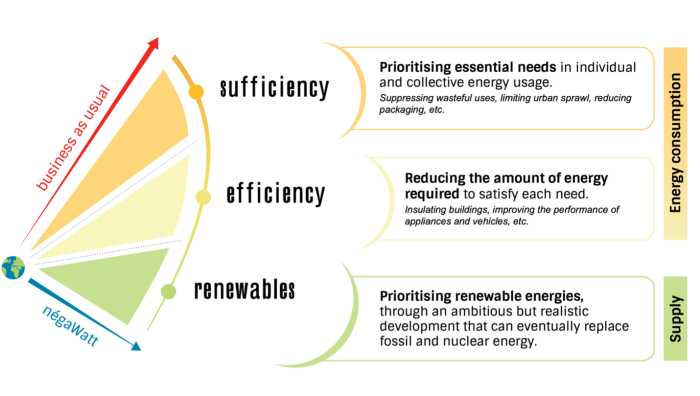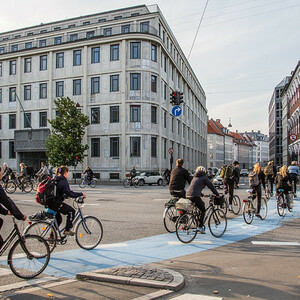
The website formerly known as Twitter is gaga over the biggest and most intricate solar roof installation in Texas (see the video here). A slate roof with 30,000 copper nails was removed before installation of the Tesla solar roof and seven big Powerwalls. The house may be a model for the use of renewables, and it may even be designed for efficiency, but there is another aspect that has to be considered: sufficiency. How much does anyone really need?

As this drawing from the French organization Association Négawatt illustrates, if we are going to reduce energy consumption, we have to increase efficiency and practice sufficiency by prioritizing essential needs. And as the Texas house demonstrates, having efficiency and renewables is pretty meaningless if you don’t also have sufficiency.
Less is more
In my recent post, Living the 100-amp Lifestyle, I quoted the Australian philosopher Samuel Alexander as saying, “Efficiency without sufficiency is lost.” For years, we have been talking about building our homes with greater energy efficiency; in the meantime, on average, they have doubled in size, eating up all those energy savings.
Alexander also writes:
“In order to take advantage of efficiency gains—that is, in order for efficiency gains to actually reduce resource and energy consumption to sustainable levels—what is needed is an economics of sufficiency. This would be a way of life based on modest material and energy needs but nevertheless rich in other dimensions—a life of frugal abundance. It is about creating an economy based on sufficiency, knowing how much is enough to live well, and discovering that enough is plenty.”
The problem in North America is that the housing industry doesn’t subscribe to the idea “enough is plenty.” As the co-authors of the Pretty Good House book put it:
“Jokes about…
Weekly Newsletter
Get building science and energy efficiency advice, plus special offers, in your inbox.

This article is only available to GBA Prime Members
Sign up for a free trial and get instant access to this article as well as GBA’s complete library of premium articles and construction details.
Start Free TrialAlready a member? Log in















27 Comments
I was once having a conversation with a friend as we drove by a new neighborhood development. Dozens of acres had been completely clear cut -- not a single mature tree was left -- and about 100 houses were going up that all looked more or less the same. You could tell that they were going to be BIG -- 4,000+ sq ft each.
I randomly commented that houses in this country (the US, btw) have gotten too big and that I thought an average family of four could be perfectly comfortable in 2500-3000 sq ft, or even less.
My friend's reaction shocked me -- he disagreed strongly and angrily.
Point is -- the "more is better" and "bigger is better" culture is so deeply ingrained in to so many folks, at least in the US, that it's hard for me to imagine enough people getting on board with a "sufficiency" mindset for it to make a dent in our carbon footprint. When otherwise reasonable people react angrily to nonchalant comments about houses being too big... we've got a problem.
One word comes to mind: lagom
"Point is -- the "more is better" and "bigger is better" culture is so deeply ingrained in to so many folks, at least in the US, that it's hard for me to imagine enough people getting on board with a "sufficiency" mindset for it to make a dent in our carbon footprint. When otherwise reasonable people react angrily to nonchalant comments about houses being too big... we've got a problem."
When we first moved to the US, we didn't have kids and started to look for a "relatively" small house at around 2,000 sqft. Our home at the time was around 1,500. Turns out there were very few of them around and our real estate agent basically told us we would have a harder time when it came to sell.
It was a tough time to buy and I stumbled on a new development where there was a cancellation. They would only allow four of the largest models to be built on the lot. I asked for a smaller one, they said no. I then offered to add a bunch upgrades so they would make as much or more as the bigger houses. They then said yes.
The real estate model is based on values of location and building. It's hard to see how anyone would destroy value and their own personal wealth by building something smaller in established neighborhoods, let alone any HOA's allowing it.
Full disclosure, most homes I design are large custom homes as long as they are ZERHs or ZEHs. I also don’t criticize my successful clients, I’m sure most of them have educated themselves, worked harder and/or have taken risks than most of us don’t.
In the US, tax laws, made by the powerful for the rich and powerful, offer advantages to build bigger homes, and even better if you have multiple homes, and you could argue that is a big economic indicator, but also know who pays biggest share of taxes too. See; https://www.federalbudgetinpictures.com/do-the-rich-pay-their-fair-share/
I do cringe when I see people wasting money in any alcohol, smokes, fancy cars, expensive clothing and accessories, or my favorite, $5k golf clubs when those folks can even brake 80 or 90, etc., etc.
Who decides who is wasting more than others? Is it jealousy? Is it envy? Maybe just a little?
I believe is human nature in most societies around the world. I have yet to see the first “rag-to-riches” person living in a tiny house. Just look at those “cribs” all successful business people, athletes and artists live at… many of them came from the middle of the pack or nothing, and if we are all honest, I dare if any of you wouldn’t do the same. Most folks want to provide more and better things for their families than their parents did for them.
Bring it on… Ha!
Warren Buffett is the rare exception to this.
"Who decides who is wasting more than others?" is pretty simple to answer; just look at embodied and operating carbon emissions. Your projects may have lower operating carbon emissions than others, but your embodied carbon emissions are enormous, especially when we're talking about clients with multiple homes. You can justify it any way you want, but your clients and projects have a much larger, negative environmental impact than someone building a code-minimum, average-sized home.
Some of my projects are also larger than I think is reasonable. I justify it, as you do, but saying that at least by working with me they are getting a higher-quality, lower-carbon home than they might if they worked with my competitors. But it's getting increasingly hard for me to look at myself in the mirror and say that with a straight face. The rich, as a whole, have a far larger negative environmental impact than the average person. I don't care how hard they worked to get there or what they think they deserve, that's just a fact. (And for the record, I know a lot of wealthy people and a lot of not-wealthy people, and I find the difference in their work ethic to largely be a myth.)
“The rich, as a whole, have a far larger negative environmental impact than the average person.” I agree, and that’s been happening for thousands of years, in all societies.
Having said that, I do believe, we as humans, need to do better… but those folks who want a 10k or 20k sf houses, or bigger, are going to have it built one way or another. Neither I nor anyone here is going to change it in the near future, although, I don’t need to justify it, we are just providing a better service for a demand that is there.
In addition, chances are the way they made their wealth had an outsized carbon impact as well.
It used to be that they could spend their money and build their mansion, and generally, we would be fine with that, keeping architects and masons and roofers employed. But as Michael Maines notes, now we have the externality of the upfront /embodied carbon emissions. It's a cost we all pay.
Armando,
There are lots of ways to draw conclusions from your bar chart. Here's one question to contemplate: "Why is it that 1% of the American population takes home 22% of all of the income earned in the country?" Hint: it's not because they work harder than the rest of us.
At some point we’ll realize that the logic of capitalism is incompatible with the health of the planet’s living things, but probably not any time soon.
@Martin - My comments are not meant to throw shade at anyone, but IN GENERAL, working harder means more education, more perseverance, higher risk taking, longer hours than most folks are willing to follow thru, and yes, sometimes luck. "The harder I work, the luckier I get." Thomas Jefferson
Living in small town of Wichita, KS, at one time the entrepreneurial capital of the US and where WSU developed a top entrepreneurship program, many of us knew and learned a lot about many old and new industry pioneers. Most of them started their business from the ground up, with long hours and lots of risk taking, see Koch Industries, Pizza Hut, Rent-a-center, Coleman, Beech, Cessna, Lear, Vulcan, etc. You could also read about the guys that started and/or run Apple, Microsoft, Amazon, Google, Oracle, FedEx and Starbucks to name a few, and just in the last 50 years.
The point is, that I designed and built houses for a couple of those guys, and I respect what they want to do with their money as long as it is as socially responsible as possible (some do and some don't) and not being crooks. They have created millions of jobs, and developed whole hearted economies for all of us to benefit.
Honestly, I believe the rest of us 99%ers, given the same position, we would be living exactly the same way. It's easier to shade others when we are not there.
...but I digress... different subject for another day.
It’s quite generous to interpret the success of the founders of these companies as the result of hard work, risk taking, and luck. But the genesis of their wealth doesn’t explain why the wealthy are permitted to consume far more than anyone else in society while those without advantage are left to suffer.
The problem with this article is that those with the means to effect real change by consuming less are the least likely to do so. Your example of Koch Industries really stands out as an example of the worst possible production, and use, of wealth.
A lot has been written about how the various policy choices in the US at the local, state and federal levels encourage people to overbuild housing.
It not just tax law. It's zoning, universal service for utilities, the way we pay for schools and the way we draw school attendance boundaries.
I appreciate the message of this article, and actually try to abide by its philosophy, but I am a distinct minority in the US. Our entire culture is based on consumption, and success is defined by accumulation of wealth. People who aren't wealthy imagine being wealthy, and people who are in the top 10% aspire to be in the top 5%, etc etc. Part of this seems to be human nature, I guess.
Thanks for the shout out, Lloyd. Taunton has asked Mike, Emily, Chris & me to write a 2nd volume on renovations. One of the first things we realized was "doing nothing" had to always be seriously considered as an option.
We keep pretending that we can "build sustainably." It's increasingly obvious that we're nowhere close.
Dan,
I realize there is a moral dimension to how we decide to act as individuals - both how we build, and who we choose to build for - but putting that aside and looking at the larger collective picture, do you think it makes much difference? Even if the residential construction industry in North American made huge changes in the way it operates, from what I've seen it wouldn't change the situation of excessive global carbon emissions in any appreciable way.
I think North American (and more especially the US) consumption always matters. We’ve got a century of the US driving a massive increase in consumption and resource use. Even now, much of the Chinese economy is based on supplying the US market.
A friend of mine said “we’re fighting for as many good days as possible” and I often think of that. Not as a reason to make trivial, largely symbolic gestures but to stop pretending that we’re part of the solution when we’re really still adding to the problem.
One of our (many) company mottos is “killing the planet slightly slower than the other guys” so I certainly don’t exempt myself.
“killing the planet slightly slower than the other guys”... I'm borrowing that!!! 😁
with my compliments, armando!
I like to shout out that book any chance I get.
“[Deleted]”
After years of volunteering with Habitat for Humanity, when I finally was shopping for a house two years ago my ideal would have been something like I'd been helping build, a 3 bed two bath 1200 square foot home with exterior insulation in an area where exterior insulation is rare. In my area Habitat builds entire neighborhoods and is one of the most productive Habitat chapters in the nation. Outside of those neighborhoods I don't see many new homes in that size range, and my income didn't qualify me for one of their homes.
Our house priorities were: built since 1980 to reduce concern of lead and asbestos, no HOA with ever changing rules to limit what we can/can't do, enough space to garden and build a workshop, high speed internet, in an area that is a short commute to most of what we want to do throughout the day. We eventually found what we wanted, but it ended up being a 2100 square foot house even though closer to 1000 would have been acceptable if it existed and cost substantially less, but most such homes were older and being torn down to be replaced with larger homes. At least we have found that our utilities cost less per month than they did in the 1950s duplex we'd rented before, despite the 1950s house being one third the size of our 1980s house.
While many neighbors are busily remodeling their kitchens, replacing siding, windows, and whatever else they can, we've tried to look at what needs to be replaced, what we can fix, and what we would like to replace something with if/when we need to, doing most of the work ourselves not just to save money but to better understand how it all goes together.
Much has been done in the past 20 years to mandate efficiency through the building code. However, the big problem is that it's process-oriented rather than result-oriented: the code dictates how things are done, not what you end up with.
So you have to use low-U glass for your skylights, but you can have as many as you want. Blower door testing advantages larger homes over smaller homes. You can build your house as large a you like, it just has to have a minimal level of insulation.
DC,
"the code dictates how things are done, not what you end up with."
Isn't that an appropriate role for it? Decisions around land-use, unit sizes, and the types of buildings allowed are best left to bylaws tailored to specific places.
I'd say the energy code is fundamentally different from other building codes in that it does try to dictate outcomes. And perhaps the problem is that building codes aren't really meant to do that. But it's something that needs to be done.
Right,
If the goal of a structural code regarding decks is to prevent a collapse and subsequent costs, then what is the goal of an energy code? To make people use a certain system, or to reduce energy use? It seems it's the latter, just as the goal of the structural code is to prevent structural issues.
Of course many people will scream bloody murder if they get an energy cap based on size/design, etc. but I agree we should be thinking about heading in a results direction somehow.
Log in or become a member to post a comment.
Sign up Log in